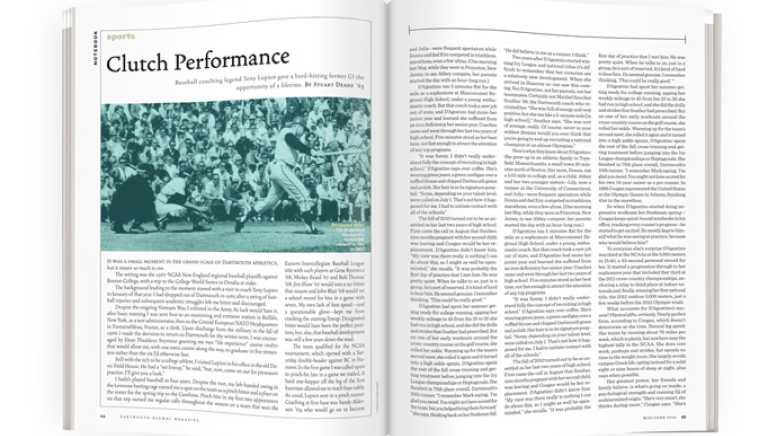It was a small moment in the grand scale of Dartmouth athletics, but it meant so much to me.
The setting was the 1967 NCAA New England regional baseball playoffs against Boston College, with a trip to the College World Series in Omaha at stake.
The background leading to the moment started with a visit to coach Tony Lupien in January of that year. I had dropped out of Dartmouth in 1963 after a string of football injuries and subsequent academic struggles left me bitter and discouraged.
Despite the ongoing Vietnam War, I enlisted in the Army. As luck would have it, after basic training I was sent first to an examining and entrance station in Buffalo, New York, as a test administrator, then to the Central European NATO Headquarters in Fontainebleau, France, as a clerk. Upon discharge from the military in the fall of 1966 I made the decision to return to Dartmouth for the winter term. I was encouraged by Dean Thaddeus Seymour granting me two “life experience” course credits that would allow me, with one extra course along the way, to graduate in five trimesters rather than the six I’d otherwise face.
Still with the itch to be a college athlete, I visited Lupien in his office in the old Davis Field House. He had a “set lineup,” he said, “but, sure, come on out for preseason practice. I’ll give you a look.”
I hadn’t played baseball in four years. Despite the rust, my left-handed swing in the Leverone batting cage earned me a spot on the team as a pinch hitter and a place on the roster for the spring trip to the Carolinas. Pinch hits in my first two appearances on that trip earned me regular calls throughout the season on a team that won the Eastern Intercollegiate Baseball League title with such players as Gene Ryzewicz ’68, Mickey Beard ’67 and Bob Thomas ’68. Jim Shaw ’67 would toss a no-hitter that season and John Blair ’68 would set a school record for hits in a game with seven. My own lack of foot speed—and a questionable glove—kept me from cracking the starting lineup. Designated hitter would have been the perfect position, but, alas, that baseball development was still a few years down the road.
The team qualified for the NCAA tournament, which opened with a Saturday double-header against BC in Hanover. In the first game I was called upon to pinch-hit late in a game we trailed. A hard one-hopper off the leg of the first baseman allowed me to reach base safely. As usual, Lupien sent in a pinch runner. Coaching at first base was Sandy Alderson ’69, who would go on to become general manager of the Oakland A’s and CEO of the San Diego Padres. Unfortunately, after one more hit, the next batter grounded into a disputed double play and we went on to lose the game.
Later, athletic director “Red” Rolfe ’31, formerly of the New York Yankees, remarked on the first-game one-hopper: “Boy, Stu, you almost took his leg off.”
In the second game my pinch-hit single into right field contributed to a late game-winning rally that forced a rubber game the next day.
In the final we took a big early lead, and a trip to the College World Series appeared likely. Then we ran out of pitchers, and BC rallied for a wild victory. The opportunity for a pinch-hitting appearance never materialized. That was the end of our season.
The next year Lupien gave me the opportunity to pitch, something I hadn’t done since my high school days, when my coach described me as “wilder than a hen hawk.” A new no-windup delivery, however, gave me some semblance of control, and I started four games at the end of the rotation and relieved in several others, including a spring game against North Carolina State in which I would replace Chuck Seelbach ’70, who would later go on to play for the Detroit Tigers. We finished the season 20-11 but didn’t receive another NCAA invitation.
That June, having lived off campus without much involvement in college social life, I left town without attending my graduation, a decision I now regret. I know what it would have meant to my parents.
Twenty years after that season I visited Lupien in Norwich, Vermont, on the way home from a family ski trip. As expected, he was most gracious. My two young sons, both avid baseball card collectors at the time, stood in awe at the baseball memorabilia in his den. As a teacher myself I know how it feels to have a former student stop by or write. It means you have mattered in the life of that person. Lupien did in mine.
My last contact with Lupien was when he called to ask for advice on a business matter for one of his children living in my area. “Your helping me tells me once again what friendship means,” he later wrote in a note of thanks. “That—plus loyalty—are two very rare commodities in the world today. I have been blessed with all the good friends we made among some fine young men that baseball blessed me with. I hope someday I can show my appreciation to you in some tangible way.”
He already had.
In response to a sympathy note I sent to his wife, Millie, upon Lupien’s death in 2004, she wrote, “He loved all you young players and found you all so willing and teachable. It was a great era for all of us. He enjoyed so much, too, the visits. He never gave up the desire to ‘keep in touch.’ ”
Now in retirement, taking stock of my life, I have been putting photos into slide shows. In one I include a photo that ran in The D of my pinch-hitting appearance in the first game of that BC double header. It brings me right back to the moment. But I still wonder what might have been—if the opportunity had arisen for me to pinch hit with everything on the line in that rubber game.
In 2006 Bob Ryan of The Boston Globe wrote a reflection piece on the death of long-time BC baseball coach Eddie “Pelly” Pellegrini, mentioning the 1967 playoff series. I sent Ryan a copy of my photo and some thoughts on the series, including the decisive Sunday game, which was won in relief by a tall, dark, lanky and angular left-hander.
“I well remember that game,” Ryan responded. “John Brazilian, whom Pelly called ‘The Sheik,’ relieved for BC and went about seven scoreless innings. Got a big hit, too. Thanks for checking in.”
Reflecting on this series always brings a smile. I still have the bat, a Vic Wertz model. And I still have a deep sense of gratitude to Lupien for giving this dropout and ex-GI a chance. That opportunity made all the difference in my Dartmouth experience.
Stuart Deane is a retired high school teacher who lives in Newburyport, Massachusetts, with his wife, Nancy.




